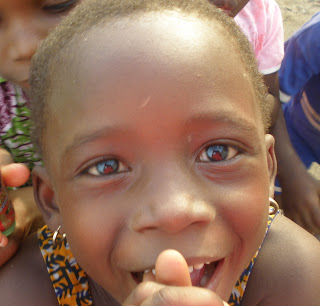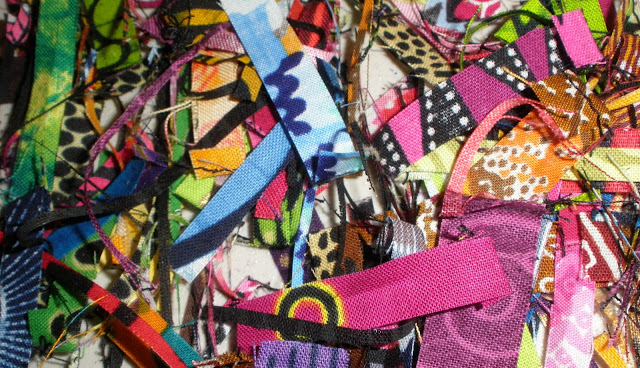Last week there was a Muslim holiday on a Tuesday (Happy Birthday, Prophet Mohammed!), so some dedicated Nigerian Field Society members decided to extend the weekend and planned a trip to Nigeria's neighbor to the west, Benin. We love to go on these trips because we always make some new friends, we get to have the safety in numbers of traveling with a group, and someone else experienced in the area has done all the hard work and we get to tag along and take advantage. We drove to the border, a trip which would have been much faster than the 2 hours it took if not for heavy traffic and bad roads. We crossed the border on foot, after filling out forms and waiting in lines, and were met by a guide with a minibus on the other side.
Benin has an interesting history and culture. It used to be called the Kingdom of Dahomey and there are some mud-brick palaces left from that time when it was a powerful country. After visiting this first palace in the capital city of Porto-Novo, we traveled up to Abomey, which was the capital city of the Kingdom.
This was a great way to see the countryside and the villages along the way.
You can just catch a small glimpse of the pig in the water behind the drummers.
Benin has an interesting history and culture. It used to be called the Kingdom of Dahomey and there are some mud-brick palaces left from that time when it was a powerful country. After visiting this first palace in the capital city of Porto-Novo, we traveled up to Abomey, which was the capital city of the Kingdom.
We weren't allowed to take any pictures inside the palaces, which is where the really interesting stuff is. What is left of the palace in Abomey is just a small portion of the huge complex that it was when the kingdom was in the height of its power. When the king was ushered out by the French in 1894, much of the palace complex was set on fire, so the French wouldn't get the buildings. There were a lot of interesting things about this culture. The king was protected by women soldiers -- referred to as Amazons. (An interesting parallel to a certain Libyan dictator who is right now losing the grip of his power, but who won't go down without a fight.) There are some interesting building decorations that show these women battling their enemies which make it clear that they were not to be messed with. But, except for these female bodyguards, it wasn't that great to be a woman in this kingdom, especially one married to the king, because when the king died, many wives were buried alive to be able to serve the king in the next world. There was a lot of human sacrifice in this kingdom, and one of the buildings that would house the king's spirit was made with mud mixed with the blood of slaves.
This palace doesn't look like much from the outside, but it is a UNESCO World Heritage site, so I was very glad to put a check mark by another one of these on my list.
Benin is a country that has kept strongly to its traditional religion. Though many citizens say they are Christian or Muslim, most also still keep to their animist beliefs and especially follow voodoo traditions. The country is covered with voodoo shrines and sites, usually marked with white flags.
We visited a "voodoo village." Not at all a tourist site, but a place where people go when they need some voodoo done. There were shrines with fetishes outside...
and inside....and the voodoo priest performing some rituals was slightly inebriated from consuming the alcohol that is part of many of the rituals.
We went to the market, which was a treat of the senses for many reasons. There was a very smelly part of the market with animal parts that were to be used in voodoo rituals: monkey heads, snakes, chicken parts and feathers. We saw a guy splitting apart the head of what had been a very pretty horned antelope. It was all kind of fascinating in a gross and smelly way. But we were told we couldn't take pictures in the voodoo part of the market.
But there were also pretty things, and not so pretty things, for sale in the market:
palm oil
soap
cassava flour
animal dung sold for fuel
nice displays of vegetables and grains.
One interesting thing in this country was that the gas pumps were few and far between, so all along the roads were "filling stations" with clear glass and plastic bottles of gasoline and gas mixed with oil for the motorcycles.
The gas is sold in clear bottles so the purchaser can see the purity of the gas. We also visited an archeological park which had some underground hideouts which had been used by the residents to hide out from warring Nigerians in the 1700s. Now they let Nigerians, and Nigerian expats, visit them -- as long as you aren't wearing red cloth. They never made it really clear WHY you couldn't wear red cloth into them. But you couldn't, and so one man in our group went shirtless into the hole. And one big underground room they had made into an art installation with these hanging bottles decorated by artists. Kind of random, but pretty.
One really fun thing we did was take a train trip on a small private train.
There was lots of pretty countryside, which looked pretty wild, but actually had a lot of small scale cultivation.
People were using the tracks as paths and we passed lots of friendly people who waved to us as
we went slowly by. Children came out running to wave at us as we passed through their villages.
There were a lot of old run-down train stations left over from colonial times. The country is trying to reestablish train travel for transport of people and goods, but right now not much is happening.
One town we passed by had a busy market covering the tracks. The train stopped before we went into town, allowing people to move off the tracks, but then we passed by and stopped to watch as very quickly the tracks disappeared back under the people and their wares.
We then traveled to Grand Popo, which is a beach resort area just a very short distance from the Togo border. The beach was lovely and the whole atmosphere was very relaxing.
In the early evening we had a nice boat ride to a village across the water, where they put on an interesting masquerade performance for us. The masquerade itself was similar to ones we had seen before, with twirling haystack performers.
But the real treat for us was that the whole village seemed to be out and they were enjoying the performance even more than we were. We loved to admire the children, who loved in turn to be admired and have their pictures taken, in between their dancing and prancing around.
The whole thing had the atmosphere of a town party, and we were pretty sure they kept celebrating long after we departed back to the hotel for our delicious Valentine's Day dinner with tables set on the beach. We weren't ready to go back to Lagos the next day!










































